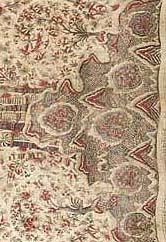STUDY NOTES
The questions for the one-hour
essay part
of the final exam will be drawn roughly (though not exactly!) from the
general kinds of questions used as subtitles for each class. There will
be two possible questions, from which one is to be chosen.
The identifications for the final
exam will
be selected from among the items below. Selected items will appear on
the
exam exactly as they do here (including any dates). There will be
twelve
items, from which ten will be chosen.
ONE--
sindhu/Ind/Hind/Sind/Indus
TWO--
Indus Valley urban
architecture
Indus Valley seals
the Indus Valley language
the end of the Indus Valley
civilization
THREE--
"Proto-Indo-European" and its
descendants
the "purusha-sukta"
the Vedic role of Agni
Indra and his conquest of Vritra
Rudra
FOUR--
the syllable "OM"
the four main "varna" categories
the Mahajanapadas
Naciketas, his father, and Yama
Kautilya's "Artha-shastra"
FIVE--
the Tirthankara Mahavira
Digambaras and Shvetambaras
krita, treta, dvapara, kali yugas
the Four Noble Truths
Jain and Buddhist monasticism-- and
women
SIX--
the Persian Empire c.490 BCE
Alexander the Great's visit, 327-326 BCE
Gandhara
Ashoka Maurya, r.c.270-230 BCE
the Pali Canon, 1st c. BCE
SEVEN--
dharma, the first end of man
avatars
Rama as a supremely just king
Sita's chastity tested
Hanuman as devotee
EIGHT--
artha, the second end of man
kama, the third end of man
Kalidasa's "Shakuntala"
Shiva's various forms
the role of Brahma
NINE--
Krishna as Arjuna's charioteer
the Bhagavad Gita
sva-dharma
karma-yoga
bhakti-yoga
TEN--
saguna bhakti
nirguna bhakti
Krishna and Radha
Surdas, late 1400's-early 1500's
Kabir, c. early 1400's?
ELEVEN--
Stein's "third wave of urbanization"
"Hindu, Muslim, British" periods
Eaton on temple destruction
Khajuraho, 10th-11th c.
the political uses of temples
TWELVE--
Four problematical theories of conversion
to Islam
Malabar and Coromandel port towns
Mahmud Ghaznavi and Somnath, c.1025/6
Lahore under the Ghaznavids,
1020-1186
Hazrat Data Ganj Bakhsh, Lahore,
1039-72
THIRTEEN--
the importance of the Mongols
the Delhi Sultanate(s), 1200-1526
the Qutb Minar and the Qubbat
ul-Islam Mosque
Guru Nanak, 1469-1539
the Guru Granth Sahib
FOURTEEN--
Akbar and the Rajputs
the mansabdari system
Akbar's religious views
Fatahpur Sikri
Raja Man Singh and Dhaka
FIFTEEN--
Jahangir and his painters
robes of honor, and salt
Shah Jahan and his architecture
Friar Manrique's experience
akhlaq
literature
SIXTEEN--
John Richards on early modernity
Aurangzeb and temple-destruction
Dara Shikoh's religious views
Aurangzeb vs. Shivaji
why the Mughal empire broke down
SEVENTEEN--
Clive at Plassey, 1757
the role of sepoys
the Company's diwani in Bengal
modern debates about Tipu Sultan
Stein on the roles of local
"gentry," 1700's
EIGHTEEN--
Ram Mohun Roy (c1774-1833)
Swami Dayananda Sarasvati (1824-83)
Shri Ramakrishna (1836-86)
Swami Vivekananda (1863-1902)
Pankaj Mishra on Hinduism
NINETEEN--
some causes of the Rebellion of 1857
Charles C. Hazewell on "nations" and
"races"
the role of the Mughal court, 1857-58
some reasons why the Rebellion of
1857 failed
Stein on the mid-1800's as a turning
point
TWENTY--
Macaulay's "Minute on Education,"
1834
Sir Sayyid Ahmad Khan (1817-98)
MAO College, Aligarh, 1877
Sir Sayyid's view of British rule
Muhammad Iqbal (1873-1938)
TWENTY-ONE--
the Indian National Congress, 1885
the partition of Bengal, 1905
swadeshi and spinning
satyagraha
the Khilafat Movement
TWENTY-TWO--
'Harijan', 'scheduled caste', 'Dalit'
Dr. Ambedkar and Buddhism
Dr. Ambedkar's critique of Gandhi
"The Annihilation of Caste"
Stein on tensions in the Congress
Party
TWENTY-THREE--
'Bharat Mata' as a deity
the Salt March, 1930
Subhash Chandra Bose (1897-1945)
Rabindranath Tagore (1861-1941)
Muhammad Ali Jinnah's early career
TWENTY-FOUR--
the "two-nation" theory
how both Congress and the League
came to agree on partition
Jinnah's first speech in the new
Pakistan
the birth of Bangladesh, 1971-72
Romila Thapar's study of sources on
Somnath
TWENTY-FIVE--
the accession of Kashmir, 1948
the Line of Control
Shaikh Abdullah of Kashmir (d.1982)
the massacre in Chitisinghpura,
March 2000
Nehru's views on Kashmir
TWENTY-SIX--
the newness, or oldness, of Santoshi
Ma
depictions of deities in
"mythologicals"
Santoshi Ma and women's life cycles
changes in Aurangabad over 25 years
Sanjay Subramanyam on "golden ages"
===========

